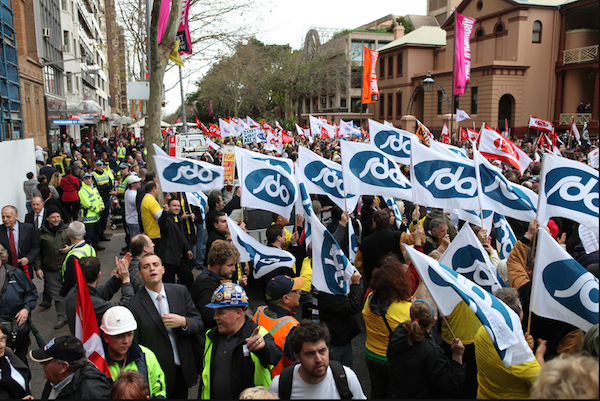The New South Wales Liberal Government must immediately withdraw changes to workplace laws for which it has no mandate, and which will place Australia in breach of international obligations.
ACTU Secretary Jeff Lawrence has warned Premier Barry O’Farrell that the entire weight of the union movement will support public sector workers in NSW in opposing the proposed new laws.
"Every day tens of thousands of hardworking public sector workers provide vital services that the people of NSW rely on," Mr Lawrence said.
"The thanks they get from the O’Farrell government is the removal of their rights at work.
"These laws would hand the State Government a blank cheque, giving them the power to unilaterally set pay and conditions, with virtually no rights of appeal.
"Public sector workers in NSW keep public services running.
"They are not just frontline workers like police, firefighters, nurses, public transport staff, utility employees, but the tens of thousands of government workers who back them up.
"We haven't seen this type of attack since the Howard Government took away rights at work with their WorkChoices laws."
Mr Lawrence has written to Mr O’Farrell to condemn the introduction of the Industrial Relations Amendment Bill (Public Sector Conditions of Employment) 2011 into the New South Wales Parliament.
"If passed, the Bill would allow the government to impose its wages policy on its employees, and remove their right to bargain or take industrial action to secure better wages," Mr Lawrence wrote.
"This would not only be unjust, but it would be a clear breach of international law and Australia’s obligation to respect human rights, which include labour rights.
"It will mean that public service workers, who work everyday to provide the people of NSW with vital services, could have their pay and important conditions cut without consultation, and without remedy."
Mr Lawrence said unions from across the country would campaign strongly to force the Government to back down on its unjust approach, beginning with a rally outside NSW Parliament this Wednesday.
"Australian unions will campaign to make sure that all NSW working people and their families know that their rights at work are worth fighting for, and worth voting for," he said.
"We firmly believe that the O’Farrell Government in New South Wales has overstepped, not just its moral obligations, but its constitutional powers as well."























